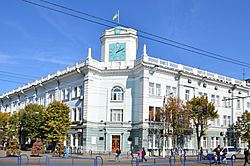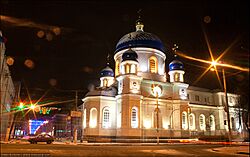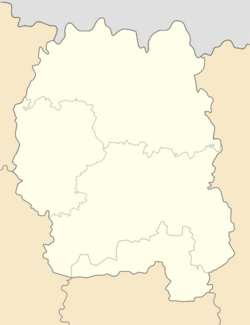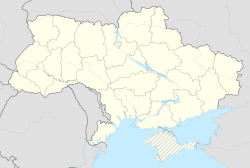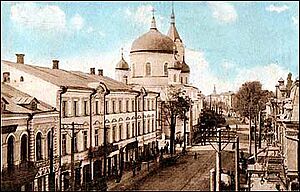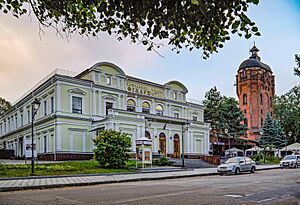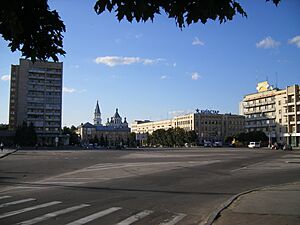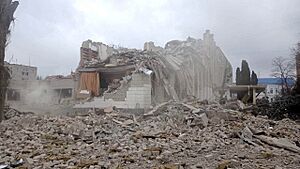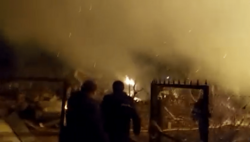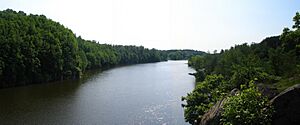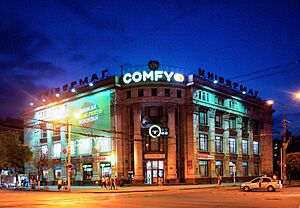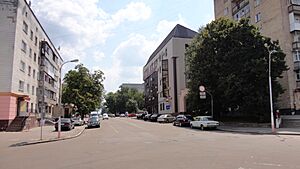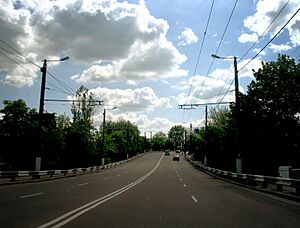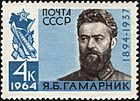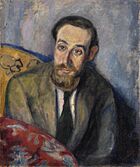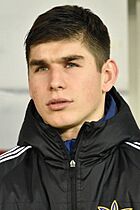Zhytomyr facts for kids
Quick facts for kids
Zhytomyr
Житомир
|
|||||
|---|---|---|---|---|---|
|
|||||
|
|||||
| Country | |||||
| Oblast | Zhytomyr Oblast | ||||
| Raion | Zhytomyr Raion | ||||
| Hromada | Zhytomyr urban hromada | ||||
| Founded | 884 | ||||
| Area | |||||
| • Total | 61 km2 (24 sq mi) | ||||
| Elevation | 221 m (725 ft) | ||||
| Population
(2022)
|
|||||
| • Total | 261,624 | ||||
| • Density | 4,290/km2 (11,110/sq mi) | ||||
| Time zones | UTC+2 (winter) | ||||
| UTC+3 (summer DST) | |||||
| Postal code |
10000 — 10036
|
||||
| Area code(s) | +380 412 | ||||
| Website | Zhytomyr | ||||
Zhytomyr (Ukrainian: Житомир) is an important city in the northern part of western Ukraine. It is the main city of Zhytomyr Oblast (a large region, like a province). It is also the center for the surrounding Zhytomyr urban hromada (a local community area) and Zhytomyr Raion (a district).
Zhytomyr is divided into two parts: Bohunskyi District and Koroliovskyi District. The Koroliovskyi District is named after the famous rocket engineer Sergey Korolyov. The city covers an area of about 65 square kilometers (25 square miles). In 2022, its population was around 261,624 people.
This city is a major transport hub. It sits on an old route that connected Kyiv with the west through Brest. Today, it links important cities like Warsaw and Kyiv, and Minsk with Izmail. Zhytomyr was also home to the Ozerne airbase, a key military air base during the Cold War.
Zhytomyr has many important businesses. These include processing wood, making food products, quarrying granite, working with metals, and making musical instruments. The Zhytomyr Oblast is also a main area for the Polish minority in Ukraine. The city has a Catholic cathedral and a large Polish cemetery, which started in 1800. It is one of the biggest Polish cemeteries outside of Poland.
Contents
What's in a Name?
The city of Zhytomyr has been known by different names in other languages throughout history.
- In Russian, it's called Zhitomir (Russian: Житомир).
- In Polish, it's Żytomierz (Polish: Żytomierz).
- In Belarusian, it's Žytomir (Belarusian: Жытомір).
- In Yiddish, it's Zhitomir (Yiddish: זשיטאָמיר).
Zhytomyr's Long History
People believe that Zhytomyr was founded around the year 884. A legend says it was started by Zhytomyr, a prince of the Slavic Drevlians tribe. This date, 884, is carved into a large stone on the hill where the city began.
Zhytomyr was an important city in Kievan Rus', an early East Slavic state. The first written records of the town are from 1240. This was when it was attacked by the Mongol armies led by Batu Khan.
In 1320, the Grand Duchy of Lithuania took control of Zhytomyr. The city was granted special rights in 1444, allowing it to govern itself more freely. After the Union of Lublin in 1569, Zhytomyr became part of the Crown of the Polish Kingdom. In 1667, it became the capital of the Kiev Voivodeship (a type of province).
In 1793, Zhytomyr became part of Imperial Russia. It was then made the capital of the Volhynian Governorate. In 1572, the town had 142 buildings, a manor house, and a castle. The city was allowed to hold two fairs each year.
During the Khmelnytsky Uprising in 1648, Zhytomyr became part of the Cossack Hetmanate state. In 1724, a Jesuit school and monastery opened here. By 1765, Zhytomyr had five churches and 285 houses.
Zhytomyr in the 20th Century
During a time of Ukrainian independence (1917-1920), Zhytomyr was the national capital of the Ukrainian People's Republic for a few weeks in 1918. However, Ukraine's fight for independence failed. The Soviet Union took control, and a new Soviet Ukrainian state was formed. From 1920, Zhytomyr was part of the Ukrainian Soviet Socialist Republic.
The city suffered greatly during the Holodomor (1932-1933). This was a terrible man-made famine caused by the Soviet government. Historical records show that over 8,015 people died in the Zhytomyr region during this time.
During World War II, Zhytomyr was under Nazi Germany's control for about two and a half years. This was from July 1941 to December 1943. The Nazi regime's actions in this area were very harsh. They aimed to remove Jewish communities and reduce the Ukrainian population.
After the Soviet Union defeated Nazi Germany, Zhytomyr became part of the Ukrainian Soviet Socialist Republic again. On August 24, 1991, Ukraine declared its independence. Since then, Zhytomyr has been part of the independent country of Ukraine.
Recent Events: 2022 Russian Invasion
During the 2022 Russian invasion of Ukraine, Zhytomyr and its surrounding areas were attacked by Russian air and missile strikes. For example, on March 2, 2022, an airstrike damaged homes, a power plant, and two hospitals. This attack sadly killed at least two people and injured many more.
On February 27, 2022, the Zhytomyr Airport was directly attacked by missiles launched from Belarus. This happened just three days after the start of the Russian invasion.
How Zhytomyr is Organized
The city of Zhytomyr is divided into two main urban districts:
| District | Population | Area |
|---|---|---|
| Bohunskyi District | 153,700 | 30 km2 |
| Koroliovskyi District | 118,500 | 31 km2 |
The city also has many smaller areas called microdistricts. These include:
- Bohunia
- Hydropark
- Hinchanka the Second
- Zavokzalny district
- Railway station area
- Korbutivka
- Kroshnia
- Maliovanka
- Marianivka
- Pavlykivka
- Putiatynka
- Rudnia
- Smokivka
- Smolianka
- Sokolova Hora
- Old Town
- Eastern microdistrict (also called Poliova)
- Khmilnyki (also called Malikova)
- Center
People and Languages of Zhytomyr
Zhytomyr has a diverse population. Here's how the population has changed over time:
| Year | Inhabitants |
|---|---|
| 1861 | 40,564 |
| 1891 | 69,785 |
| 1897 | 65,895 |
| 1926 | 76,700 |
| 1939 | 95,100 |
| 1941 | 40,100 |
| 2005 | 277,900 |
| 2015 | 269,493 |
Languages Spoken
Most people in Zhytomyr speak Ukrainian. Here's a look at the main languages spoken at home, based on the 2001 census and a 2023 survey:
| Language | Percentage (2001 Census) | Percentage (2023 Survey) |
|---|---|---|
| Ukrainian | 83.18% | 82% |
| Russian | 16.27% | 14% |
| Other or undecided | 0.55% | - |
| Total | 100.00% | 100% |
Roman Catholics in Zhytomyr
Zhytomyr has been an important center for the Roman Catholic Church since 1321. The city's main Catholic church is the Cathedral of the Holy Wisdom.
The Zhytomyr cemetery, opened in 1800, is a significant historical site. It was first used for Polish noble families. Later, other Catholics, including Germans, Ukrainians, and Russians, were buried there. In 1840, the Chapel of St. Stanislaus was built. The cemetery was divided into nine sections, each named after a saint. After the Soviet era, the cemetery was damaged, but it is now being restored.
Many famous people are buried here, including:
- Bronislaw Matyjewicz-Maciejewicz, an early Polish pilot.
- Karol Niedzialkowski, a bishop.
- Juliusz Zarębski, a Polish composer.
- The parents of Ignacy Jan Paderewski, a famous Polish musician and statesman.
- Members of the family of Stanisław Moniuszko, a Polish composer.
Jewish Community in Zhytomyr
Zhytomyr had a small Jewish population during the Khmelnytsky Uprising in 1648. But by 1778, when it became part of Russia, it had a large Jewish community. It became an important center for the Hasidic movement. By 1861, Jews made up nearly one-third of the city's population.
Zhytomyr was considered an official Jewish center in the southern part of the Pale of Settlement in Imperial Russia. From 1845 to 1862, it was one of only two cities where Hebrew books could be printed. The government also set up rabbinical schools in Zhytomyr and Vilnius to encourage secular education among Jews.
The Jewish community in Zhytomyr faced difficult times, including pogroms (violent attacks).
- In May 1905, a part of the city was destroyed, and 20 people were killed.
- In January 1919, 15 young Jewish people were killed while trying to defend their community.
- In March 1919, 317 people died in another attack.
During the Holocaust, the Jewish community in the region was largely destroyed. Many Jewish people were tragically murdered by Nazi forces and their helpers.
Today, the Jewish community in Zhytomyr has about 5,000 members. They have an old synagogue in the city center with a mikveh (a ritual bath). There are also educational institutions run by the Chabad movement.
Culture and Arts in Zhytomyr
Zhytomyr is a city rich in culture. It has two state theaters, a philharmonic orchestra, more than 10 museums, many libraries, and a planetarium.
One of the most famous museums is the Serhiy Pavlovych Korolyov Museum of Cosmonautics. It is dedicated to Sergei Korolev, a key figure in the Soviet space program, who was born in Zhytomyr.
Theaters and Music
- In 1809, the first permanent theater building was built in Zhytomyr.
- In 1858, the first stone theater in Ukraine was built. Famous performers like Marko Kropyvnytskyi and Maria Zankovetska performed here.
- Today, the city has:
- The Academic Ukrainian Music and Drama Theater named after Ivan Kocherga.
- The Academic Regional Puppet Theater.
- The Philharmonic named after Svyatoslav Richter.
- The Zhytomyr Academic Dance Ensemble "Sun" has been performing since 1973.
- The internationally known chamber choir OREYA is also based in the city.
- Famous composers Borys Lyatoshynsky and Sviatoslav Richter were born in Zhytomyr.
Museums to Explore
Zhytomyr offers many museums for visitors:
- Historical and local lore museum.
- Art gallery.
- Museum of nature.
- V. G. Korolenko Literary Memorial Museum.
- Memorial house-museum of academician Sergei Korolev.
- Literary museum of Zhytomyr Region.
- Museum of the history of fire protection.
- Sergei Pavlovich Korolyov Museum of Cosmonautics.
Libraries for Learning
The city has several important libraries:
- Zhytomyr Regional Universal Scientific Library named after Oleh Olzhych.
- Zhytomyr Regional Scientific Medical Library.
- Zhytomyr Regional Library for Youth.
- Zhytomyr Regional Library for Children.
Architecture and Monuments
Zhytomyr has many historical and cultural landmarks. There are 74 historical monuments, 24 archaeological sites, and 15 monuments of art. Ten buildings are considered important national architectural sites.
Some notable buildings and religious sites include:
- Cells of the Jesuit monastery (built in 1724).
- Holy Dormition Bishops Cathedral (1874).
- Church of St. James.
- Seminary Church of St. John of Dukla.
- Saint Sophia Cathedral.
- St. Michael's Cathedral.
- Holy Exaltation of the Cross Cathedral.
- Transfiguration Cathedral.
- Lutheran Church.
- Water tower.
In 1996, a Memorial to the Victims of Fascism was built in Bohunia. This marks the location of a concentration camp for prisoners of war during World War II.
Geography and Nature
Zhytomyr is surrounded by beautiful nature. Ancient forests border the city on all sides. Several rivers flow through these forests, including the Teteriv, Kamianka, Kroshenka, and Putiatynka. The Teteriv River usually forms the southern edge of Zhytomyr. The city also has many parks and public squares.
The city's streets are mostly arranged in a radial pattern, like spokes on a wheel. The center is at the main public square, called Sobornyi Maidan (Cathedral Square). The historical center of Zhytomyr is in the southern part of the city. The old town sits on three rocky hills over the Kamianka River: Okhrimova, Zamkova, and Petrovska.
New housing areas surround the old town. The main streets connecting Sobornyi Maidan to the city's edges are Kyivska Street (going northeast towards the railway and bus stations), Velyka Berdychivska Street (going southeast), Lech Kaczyński Street (going southwest), and Peremohy Street (going north).
Mykhailivska Street is a well-known pedestrian street in the city center. It is named after St. Michael's Church at its northern end. Vehicles are not allowed on this street, except for some slow-moving ones. A puppet theater is located in the middle of the street, and the Zhytomyr City Council building is at its southern end. This street has many small coffee shops and cafés.
The most famous park in Zhytomyr is named after Yuri Gagarin. It is in the south of the city, on the northern bank of the Teteriv River. This park used to belong to the Baron de Chaudoir.
Climate of Zhytomyr
Zhytomyr has a moderate climate. Here's a look at the average weather conditions:
| Climate data for Zhytomyr (1981–2010) | |||||||||||||
|---|---|---|---|---|---|---|---|---|---|---|---|---|---|
| Month | Jan | Feb | Mar | Apr | May | Jun | Jul | Aug | Sep | Oct | Nov | Dec | Year |
| Record high °C (°F) | 14.0 (57.2) |
17.4 (63.3) |
22.7 (72.9) |
30.0 (86.0) |
33.3 (91.9) |
35.0 (95.0) |
36.1 (97.0) |
36.2 (97.2) |
32.8 (91.0) |
26.1 (79.0) |
22.0 (71.6) |
14.1 (57.4) |
36.2 (97.2) |
| Mean daily maximum °C (°F) | −1.0 (30.2) |
0.0 (32.0) |
5.3 (41.5) |
13.7 (56.7) |
20.3 (68.5) |
22.9 (73.2) |
24.9 (76.8) |
24.3 (75.7) |
18.7 (65.7) |
12.4 (54.3) |
4.7 (40.5) |
0.0 (32.0) |
12.2 (54.0) |
| Daily mean °C (°F) | −3.7 (25.3) |
−3.2 (26.2) |
1.3 (34.3) |
8.4 (47.1) |
14.6 (58.3) |
17.4 (63.3) |
19.2 (66.6) |
18.4 (65.1) |
13.3 (55.9) |
7.7 (45.9) |
1.8 (35.2) |
−2.5 (27.5) |
7.7 (45.9) |
| Mean daily minimum °C (°F) | −6.4 (20.5) |
−6.2 (20.8) |
−2.3 (27.9) |
3.6 (38.5) |
8.7 (47.7) |
12.0 (53.6) |
13.9 (57.0) |
12.9 (55.2) |
8.5 (47.3) |
3.6 (38.5) |
−0.8 (30.6) |
−4.9 (23.2) |
3.6 (38.5) |
| Record low °C (°F) | −35.0 (−31.0) |
−28.0 (−18.4) |
−25.0 (−13.0) |
−13.2 (8.2) |
−2.7 (27.1) |
1.0 (33.8) |
1.4 (34.5) |
0.0 (32.0) |
−4.0 (24.8) |
−10.7 (12.7) |
−24.0 (−11.2) |
−30.5 (−22.9) |
−35.0 (−31.0) |
| Average precipitation mm (inches) | 31.1 (1.22) |
31.2 (1.23) |
35.1 (1.38) |
44.5 (1.75) |
59.4 (2.34) |
90.2 (3.55) |
83.3 (3.28) |
70.8 (2.79) |
59.0 (2.32) |
37.1 (1.46) |
44.7 (1.76) |
36.5 (1.44) |
622.9 (24.52) |
| Average precipitation days (≥ 1.0 mm) | 7.9 | 7.6 | 7.7 | 7.6 | 8.3 | 10.6 | 9.9 | 7.2 | 8.0 | 6.8 | 8.2 | 8.3 | 98.1 |
| Average relative humidity (%) | 85.3 | 83.2 | 78.0 | 68.9 | 66.7 | 72.1 | 73.0 | 72.5 | 77.4 | 80.4 | 86.1 | 87.4 | 77.6 |
| Source 1: World Meteorological Organization | |||||||||||||
| Source 2: Climatebase.ru (extremes) | |||||||||||||
Economy and Industry
Zhytomyr is an important economic center for its region. The city has many different types of businesses. These include factories that make glass, metal products, electronic devices, screens, fabrics, furniture, and shoes.
There is also a large factory in Zhytomyr that makes medicines. Since 1944, a confectionery (candy and sweets) factory has been operating in Zhytomyr. This company is one of the top leaders in the Ukrainian confectionery market.
The city is also home to the Zhytomyr Armored Factory. This factory has been a main repair facility in Ukraine since the start of the Russo-Ukrainian War. It works three shifts a day to keep up with demand. In September 2014, the Ministry of Defense of Ukraine placed a large order with the factory.
Getting Around Zhytomyr
In ancient times, Zhytomyr was on a key road from Kyiv to Brest-Litovsk. Today, this road is part of an international highway (M06/E40). It connects Kyiv to the Hungarian border.
Other important roads include:
- M21/E583, connecting Roman and Zhytomyr (through Vinnytsia).
- H03, connecting Zhytomyr to Chernivtsi (through Khmelnytskyi).
- P18, connecting Zhytomyr to Stavyshche.
- P28, connecting Zhytomyr to the Ukrainian-Belarusian border.
Train Travel
Railways connect Zhytomyr with several other cities. These include Koziatyn (through Berdychiv), Korosten, Zviahel, Korostyshiv, and Fastiv. In 2011, the train line between Fastiv and Zhytomyr was updated to use electricity.
Trains that pass through Zhytomyr train station include routes like:
- Zhytomyr - Korosten
- Vinnytsia - Korosten
- Zhytomyr - Korostyshiv
- Korosten - Koziatyn
- Zhytomyr - Koziatyn
- Zhytomyr - Zviahel
- Zhytomyr - Fastiv
Zhytomyr is about 131 kilometers (81 miles) from Kyiv by road.
Air and Bus Travel
The city has an airport, but it is not currently used for passenger flights. It was designed for strategic bombers.
Zhytomyr has three bus stations. These connect the city with many other towns and villages in Ukraine and even other countries.
The city also has fifteen bridges and junctions over rivers and roads. A 30-kilometer (19-mile) ring road goes around Zhytomyr. The most interesting bridge is over the Teteriv River in Gagarin Park.
City Public Transport
Within Zhytomyr, people use public transport like trolleybuses, buses, and minibuses. There are also electric trams, but only on one route now. Zhytomyr was the fifth city in present-day Ukraine to have electric trams, starting in 1899. Trolleybuses began operating in 1962.
The total length of Zhytomyr's electric transport routes (trolleybuses and trams) is 275 kilometers (171 miles). Zhytomyr was the first city in Ukraine to use an e-ticket system for all its public transport.
Sister Cities
Zhytomyr is twinned with several cities around the world. This means they have special friendly relationships.
Famous People from Zhytomyr

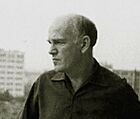
Many notable people have come from Zhytomyr or have strong connections to the city. These include:
- Ossip Bernstein (1882–1962), a chess Grandmaster.
- Hayim Nahman Bialik (1873–1934), a famous Hebrew poet.
- Jarosław Dąbrowski (1836–1871), a Polish nobleman and revolutionary.
- Alexander Kipnis (1891–1978), a German and American opera singer.
- Vladimir Korolenko (1853–1921), a Russian writer and human rights activist.
- Sergei Korolev (1907–1966), a rocket engineer who led the Soviet space program.
- Borys Lyatoshynsky (1895–1968), a Ukrainian composer.
- Oleh Olzhych (1907-1944), a Ukrainian writer.
- Sviatoslav Richter (1915–1997), a distinguished Soviet pianist.
- Michael Rostovtzeff (1870–1952), a Russian historian and archaeologist.
- David Shterenberg (1881–1948), a Russian Soviet painter.
- Vladimir Veksler (1907–1966), a physicist who helped create the particle accelerator.
- Juliusz Zarębski (1854–1885), a Polish composer and pianist.
Sports Figures
Zhytomyr has also produced talented athletes:
- Anastasiya Chernenko (born 1990), a professional triathlete.
- Ruslan Malinovskyi (born 1993), a Ukrainian footballer.
- Danylo Sikan (born 2001), a Ukrainian footballer.
- Yuriy Vernydub (born 1966), a Ukrainian football coach and former player.
Gallery
See also
 In Spanish: Zhitómir para niños
In Spanish: Zhitómir para niños
 | Frances Mary Albrier |
 | Whitney Young |
 | Muhammad Ali |


